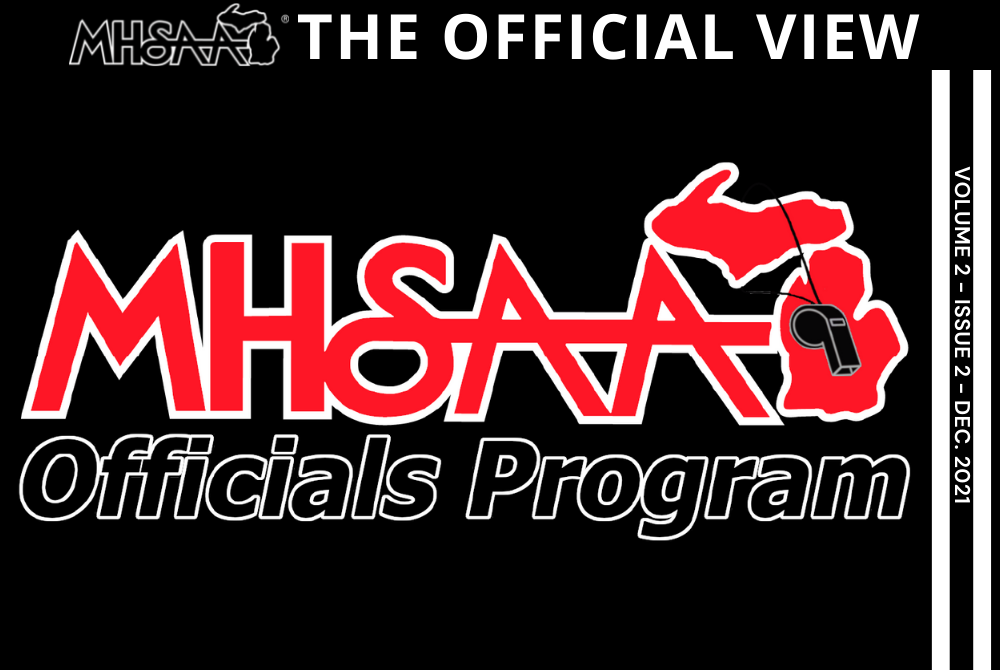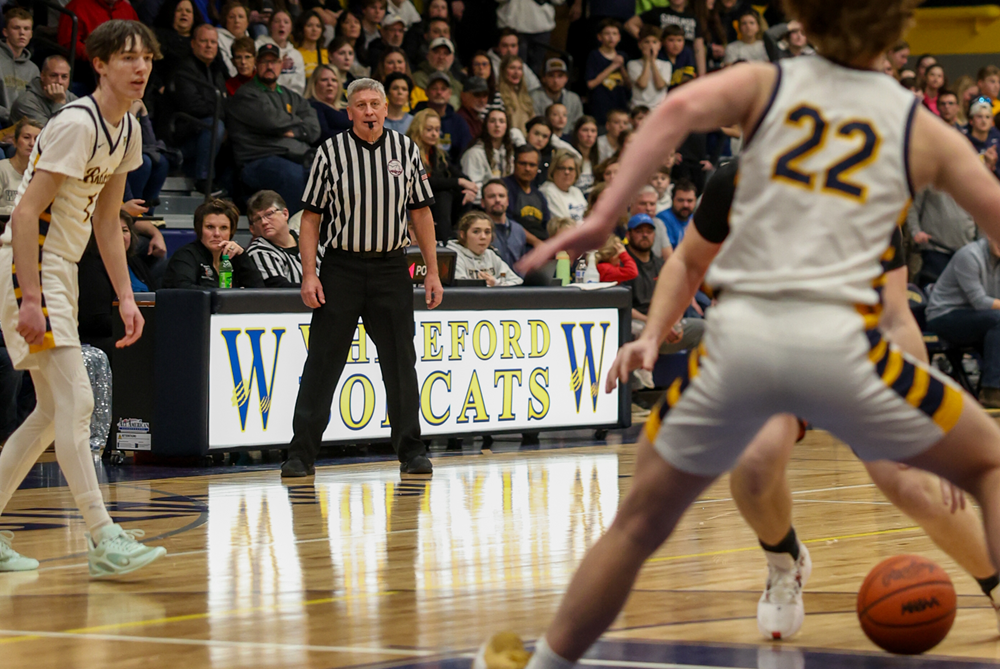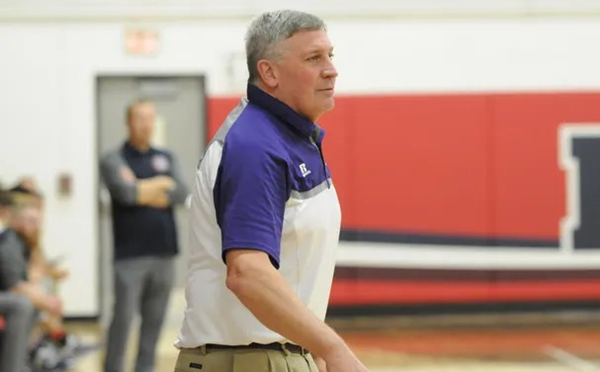
The Official View: The Crossroad We Face
By
Brent Rice
MHSAA Assistant Director
December 20, 2021
It’s time to call it what it is … a major crossroad and tipping point.
For more than a decade, the numbers of registered MHSAA officials have steadily declined from a high of about 13,000 to, today, around 7,700. While the COVID pandemic has certainly exacerbated those figures over the last two seasons, two of the top reasons officials give for leaving the avocation remains adult spectators and coach behavior.
School sports and traditional recreational programs have been supplemented, and in some cases, supplanted, by travel and club programs that, more often than not, do not share the same values and standards expected in education-based athletics. Many of these non-school programs require parents to spend exorbitant amounts in registrations fees, travel, lodging and meals with the implicit suggestion that this is the gateway to Division I college and professional sports. The result is that the criticisms hurled at the officials are more than an overzealous parent wanting a fair-called game – it is stakeholders defending their investments.
While we are often disturbed by some of the events documented during these club and travel contests, the real concern is that this permitted conduct has begun to seep into the school sports world. The result is that officials are simply walking away, leaving increasingly more games being moved or cancelled due to the lack of officials. The games that are being played are often staffed with smaller crews – perhaps two officials instead of three. Officials are in place to provide athletes with safe and fair opportunities to play sports, and shorthanded crews may reduce the ability for officials to see and call plays and fouls. These potential missed calls incite more disparaging comments from spectators, thus pushing more officials away from sports. This cycle cannot be sustainable much longer.
So, what are the solutions, and who do they come from?
The first is spectators. We refer to this as the difference between the whistle and the airhorn. When spectators just feel compelled to be vocally critical, they should make certain that their criticisms are infrequent, brief and not personal. Spectators should be the whistle and not the airhorn. Other spectators have a responsibility to set a good example and call out those who are going overboard.
School administrators also play a critical role in ensuring that officials are able to do their job in a safe and secure setting. Administrators should look for escalating situations in the stands and diffuse them before they become abusive. No one wants to remove parents and other spectators from events; but frankly, more of that needs to be done to show that inappropriate conduct and behavior will not be tolerated.
Finally, MHSAA officials need to be the first line of defense against unsportsmanlike behavior. This should be penalized when observed from coaches or players, without concern to the consequences that student or coach will later face. In short, bad behavior cannot be tolerated. Conduct found in the MHSAA Personal Attack Policy should result in an immediate ejection/disqualification, and similar conduct that occurs after the game should be handled as provided in the Post-Contest Ejection Policy. Unaddressed bad behavior by coaches and players encourages the same from spectators.
MHSAA game officials should focus their attention to the competition on the playing surface. This means that most comments from the stands should be ignored, and an official should never engage with critical spectators. This is not to say that officials must take abuse from spectators. If the language or behavior becomes a distraction to the contest, or personal and vulgar language is directed at the officials, the officials have the authority to have spectators removed from the facility (and should do so). No need for a big spectacle, ejection mechanic or yelling into the stands to engage fans. They should simply stop the contest and have the administrator on site remove the unruly spectator from the game.
There are a number of other factors contributing to the decline of officials that also need to be addressed. Low game fees, substandard locker room accommodations, unmanageable game times, and assigner and association politics all play a part. Those all pale in comparison to the main reason cited: Misbehavior by adults. MHSAA officials will inevitably continue to miss calls. That’s the nature of what they do. However, without them the games cannot be played, which means opportunities for Michigan students will also decline. We all have a responsibility to see that school sports remain closely tied to the values of educational athletics and maintain scope and perspective. We all must do better; otherwise, the crossroads of the officials shortage will only get worse.
It’s Official!
Postseason Assignments: Winter sport officials need to pay close attention to the changes for postseason consideration in effect this school year. Officials in most sports must opt into tournament consideration. This means officials this season for basketball, competitive cheer, gymnastics, ice hockey and wrestling must submit their availability on the MHSAA website – otherwise, the default is that they are unavailable. This is in addition to other postseason requirements such as completion of the rules meeting, the tournament exam and submission of the official’s regular-season schedule through the MHSAA website. These requirements are due by Dec. 15 for wrestling, Jan. 5 for basketball, Jan. 12 for competitive cheer and ice hockey, Jan. 19 for gymnastics and Jan. 26 for boys swimming & diving.
Seeking Committee Members: We are reconvening an ad hoc committee of educators/officials to assist with the development of curriculum that can be utilized by school districts for officiating classes in conjunction with the MHSAA Legacy Officials Program.
If you’re interested in serving on this committee (some in-person, but mostly virtual) and have a background as an educator, please reach out to [email protected].
Know Your Rules
BASKETBALL As Team A is preparing to make a throw-in from the end line, Team A players #15, #20 and #3 stand shoulder-to-shoulder next to each other immediately in front of the thrower. Team B player #11 requests to stand between two of the A players before the throw-in.
RULING Within three feet on the court from the throw-in, Team B players will be permitted to stand between the Team A players, if requested. If the Team A players were positioned more than three feet from the throw-in, this request would be denied.
It’s Your Call
REVIEW The play from the last It’s Your Call (found here) involved ball-handling by a back row volleyball player. Following a good dig by her teammate, the back row player appears to make contact with her left hand then right hand with her overhead pass. Since this is not the first contact on her side, the contact with the ball must be simultaneous with both hands. This is a multiple contact and a loss of point against white.
WRESTLING For the first time, the MHSAA will introduce a Girls Division into this year’s Individual Wrestling Finals. The following “It’s Your Call” takes place in a girls match but is applicable to the sport as a whole. Review the brief clip and let us know your thoughts. What’s the call?

Sullivan Returns to Court After Coaching, Sees Game In New Ways as Official
By
Doug Donnelly
Special for MHSAA.com
February 6, 2024
Gary Sullivan is getting a whole new perspective on basketball.
 After 25 years of coaching the game on several levels – including the last six as the boys varsity coach at Blissfield Community Schools – Sullivan has replaced his school logo with stripes and a whistle. He’s enjoying his second basketball career, this time as a referee.
After 25 years of coaching the game on several levels – including the last six as the boys varsity coach at Blissfield Community Schools – Sullivan has replaced his school logo with stripes and a whistle. He’s enjoying his second basketball career, this time as a referee.
“I’m having a good time,” said Sullivan, who will retire this month as a teacher at Blissfield. “I’ve had fantastic experiences so far. I hope it stays that way.”
Sullivan is an Ohio native, having grown up just across the state line and attended Evergreen High School. After graduating from the University of Toledo, he landed a teaching job at Blissfield. Early on, he took a stab at officiating basketball.
“(Former Blissfield baseball coach) Larry Tuttle got me into it,” he said. “I did a few middle school and some junior varsity games. Then, when I became an athletic director pretty early in my career, I gave officiating up.”
He started coaching along the way, from youth sports to middle school basketball. He took over as the Blissfield varsity coach in 2016-17
After winning seven games over two seasons with an experienced roster, Blissfield rebounded with 12 wins in 2018-19 and 19 in 2019-20 – the most for Blissfield since 1992.
The Royals won Lenawee County Athletic Association and Division 2 District titles in 2021. The LCAA title was the first for the Royals since 2003, and the District championship was the first for the school since 2004. He won 60 games in all and earned two county Coach of the Year awards.
He stepped down as basketball coach two years ago.
It wasn’t long and he was being courted to help tackle the referee shortage in Michigan and across the country. His brother, Terry, is a basketball official in the Jackson area.
“When I was finished coaching, I started thinking about it again,” Sullivan said. “My brother does a ton of officiating in the Jackson area. He told me, ‘Just do it. It will be fun. What else are you going to do in the middle of the winter? You might as well referee.’ It gives you a chance to still be involved in the game.”
Initially, Sullivan figured he’d officiate a few middle school and junior varsity games. Once he got his feet wet and adjusted to life with the whistle, however, he was hooked.
 “Last year was my first year – that was my intention, do middle school and some JV, maybe a couple of days a week,” he said. “Before I knew it, they were assigning me games left and right. The more I did it, the more I liked it. By the end of the year, they had the chance to assign a couple of varsity games. No one complained too awful bad, and they gave me a few more.”
“Last year was my first year – that was my intention, do middle school and some JV, maybe a couple of days a week,” he said. “Before I knew it, they were assigning me games left and right. The more I did it, the more I liked it. By the end of the year, they had the chance to assign a couple of varsity games. No one complained too awful bad, and they gave me a few more.”
With his basketball background, Sullivan found being a referee an outlet for his competitive nature.
“Being around basketball has made it much easier for me than someone who just comes in and, ‘Hey, I’ll try to do this,’ he said. “You are competing with yourself a little to make the right call and keep the game flowing along.”
There have been a few unexpected moments in the transition from coach to referee.
For one, Sullivan said, being on the court is a completely different perspective than being on the sidelines.
“It is so much faster when you have to run and follow that person than it is when you sit there and watch it,” Sullivan said. “When you have to run, get to your primary spot, then keep the peripheral vision going to watch everything, it's much faster, more difficult than I ever anticipated.”
Sullivan said certain aspects of the game are different, too.
“As a coach, I always anticipated what I thought was going to happen,” he said. “In your mind you know someone is going to travel, then as soon as they travel, you are yelling ‘Travel!’ As an official, it is better to be a second late and be correct than a second early and be wrong.
“To me, the toughest transition has been to slow down, wait for the actual play to let itself run its course. Make sure it really was a foul. Think about it. Don’t get in a rush to make the call.”
He’s grateful to other area officials who have helped him learn the tricks of the trade during either formal training sessions or by example. He’s had the chance to review some of his games on film, which has helped him dissect the game from a new angle. He’s also learned from coaching to block out fans and people from the crowd who might disagree with a call.
“I have not had a negative experience yet from a fan,” he said. “As a former coach, I put myself on double probation – I dished out enough that maybe I’m a little more tolerant than some other officials. That’s just my personality at this point.”
This year Sullivan has had a full schedule of middle school games plus about a dozen girls varsity basketball games and a handful of boys varsity games. The most recent was Friday in Ottawa Lake in front of a big crowd watching rivals Whiteford and Summerfield.
“That was a ton of fun – full house, competitive game. I was glad to be a part of it,” Sullivan said.
There’s another bonus to being an official. When the game is over, he can go home and sleep. No more late nights watching film or scouting for the upcoming opponent.
“My cats are much happier,” he said. “I’m not waking up at 4:30 in the morning and watching a film, then going back to bed. It’s fun. I’m enjoying it.”
 Doug Donnelly has served as a sports and news reporter and city editor over 25 years, writing for the Daily Chief-Union in Upper Sandusky, Ohio from 1992-1995, the Monroe Evening News from 1995-2012 and the Adrian Daily Telegram since 2013. He's also written a book on high school basketball in Monroe County and compiles record books for various schools in southeast Michigan. E-mail him at [email protected] with story ideas for Jackson, Washtenaw, Hillsdale, Lenawee and Monroe counties.
Doug Donnelly has served as a sports and news reporter and city editor over 25 years, writing for the Daily Chief-Union in Upper Sandusky, Ohio from 1992-1995, the Monroe Evening News from 1995-2012 and the Adrian Daily Telegram since 2013. He's also written a book on high school basketball in Monroe County and compiles record books for various schools in southeast Michigan. E-mail him at [email protected] with story ideas for Jackson, Washtenaw, Hillsdale, Lenawee and Monroe counties.
PHOTOS (Top) Official Gary Sullivan monitors the action while working a boys basketball game at Ottawa Lake Whiteford. (Middle) Sullivan directs his team from the sideline during his tenure as Blissfield’s boys basketball coach. (Top photo by Mike Doughty; middle photo courtesy of the Adrian Daily Telegram.)

